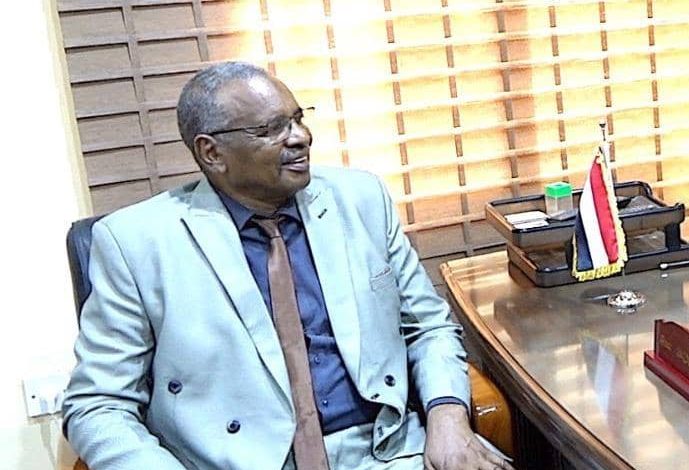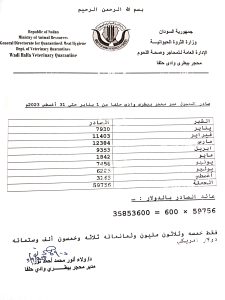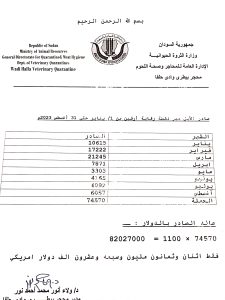Ministry of Animal Resources Undersecretary Dr. Hassan Al-Toum, to (Sudan Events) Many levies and fees imposed on animals makes them lose their external competition

– We started with preliminary agreements to export meat to Algeria as an entry point to Europe
– The export volume is very large in 2023 compared to 2022
– Livestock losses from the war have not been calculated yet, but they are very large
Sudan Events – Interview : Rehab Abdullah
The Undersecretary of the Ministry of Livestock, Dr. Hassan Al-Toum, confirmed to (Sudan Events) With many levies and fees imposed on exported livestock, he said in his interview with (Sudan Events) that it makes the animal lose external competition. The agent confirmed the validity of the numbers exported for this year and provided documents (published with the interview ). He added that volume of exports is very huge in 2023 compared to 2022, and he affirmed their seriousness in opening markets. New, revealing the start of signing initial agreements to export meat to Algeria as an entry point to Europe,
He confirmed that the livestock sector was damaged as a result of the war. He affirmed that the losses had not been counted so far, but only that they were very large. More details in his following statements:
You announced a large figure for the volume of livestock exports during wartime conditions.
Did you mention that it amounted to half a billion, but some people doubted it?
We are talking in real figure confirming that exports have doubled this year compared to the previous year, according to the 2023 report for the ten months, as the revenue from calves exported from January to August amounted to $35,853,600, while the revenue from camel exports amounted to $82,027,000, and the total export revenue amounted to approximately $500 million. Compared to 2022 exports, all live export revenues amounted to 2,300.00 million.
What about exports to the Kingdom of Saudi Arabia that suffered from return problems due to immunodeficiency?
Exports to Saudi Arabia are proceeding in an excellent manner, and the cooperation of the brothers in Saudi Arabia has overcome many difficulties. With strict procedures and the understanding of all exporters of the necessity of adhering to international quarantine procedures, we have been able to overcome the return of ships. Out of a total of 211 ships, only one ship was returned for reasons not related to immunity at all.

What are the obstacles to export?
There are many obstacles to exports, and we are trying to develop solutions to them, including rehabilitating quarries and laboratories to examine samples. We have used the partnership system with the private sector to rehabilitate a number of veterinary quarries, but the war conditions stopped the activity, and it will be resumed after the end of the war.
Livestock exporters complain about high taxes?
Yes, one of the main obstacles to the live animal export process is the levies across the states up to the export quarry. The large number of these fees imposed on the animal raises its price and loses external competition. Had it not been for the advantage of natural pasture and the good quality of meat, we would have exited the global market due to the large number of fees and levies.

How did the war affect exports?
The war had direct impact on meat exports, as all export slaughterhouses are located in or near Khartoum State, which led to a complete cessation of meat exports, except for the coastal slaughterhouse in the Red Sea, which does not represent 5% of meat exports. We thought about establishing alternative slaughterhouses for compensation in each of the states. The Nile River, where the Tala slaughterhouse, which is expected to open before the end of the year, has been approved to export meat from 500 cows and 3,000 small animals per day. It has been approved by the Saudi Food and Drug Authority and approved by the Ministry.
The Gedaref slaughterhouse has been rehabilitated and its capacity has been expanded, and it will enter service soon. Permits have been given to the Abdat slaughterhouse on the island for construction soon. There is preparation to establish export slaughterhouses in Sinnar State, White Nile State, and Blue Nile Region, to complete the export cycle by exporting from production sites.
What are the losses of livestock as a result of the war?
Livestock losses from the war have not been counted yet, but they are very large losses, starting with the destruction of the veterinary research center, especially the poultry factory that produces, and its absence is a threat to the extinction of the poultry sector due to the lack of production of vaccines that were produced in the factory and the lack of tests, to the destruction of the equipment for examining, diagnosing and monitoring poultry diseases. Journal of diseases and global follow-up of the situation of poultry diseases.
Livestock lost a lot of furniture, equipment, and vehicles, and offices and laboratory animals were destroyed…etc.
Is there a plan to open new markets?
Regarding new markets, we have already begun preliminary agreements to export meat to Algeria for the first time, exporting to the north of the continent and entering Europe via Algeria, and we have received many requests wanting Sudanese meat, as well as Oman Sultanate as a new opening for live exports and meat.



